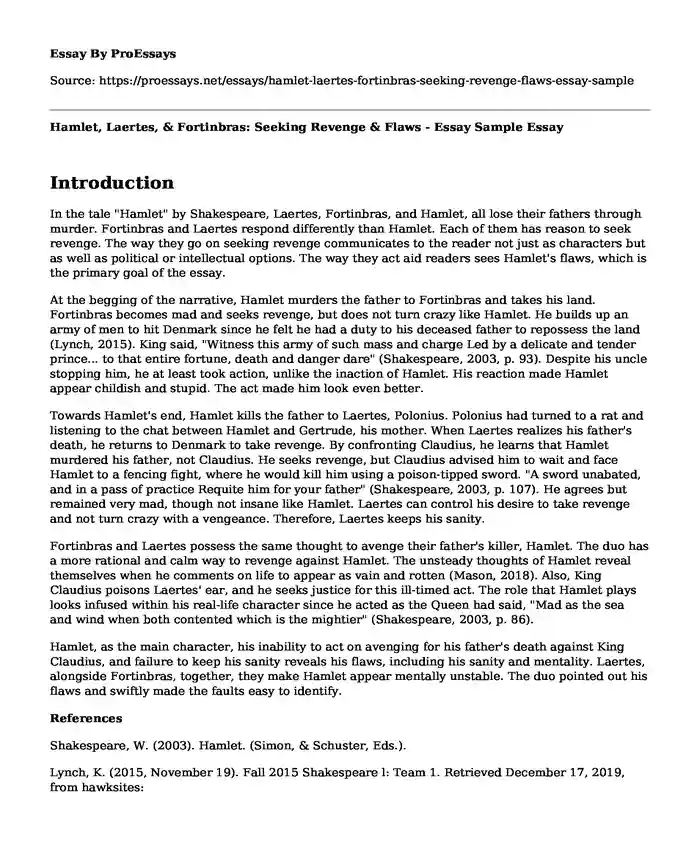Introduction
In the tale "Hamlet" by Shakespeare, Laertes, Fortinbras, and Hamlet, all lose their fathers through murder. Fortinbras and Laertes respond differently than Hamlet. Each of them has reason to seek revenge. The way they go on seeking revenge communicates to the reader not just as characters but as well as political or intellectual options. The way they act aid readers sees Hamlet's flaws, which is the primary goal of the essay.
At the begging of the narrative, Hamlet murders the father to Fortinbras and takes his land. Fortinbras becomes mad and seeks revenge, but does not turn crazy like Hamlet. He builds up an army of men to hit Denmark since he felt he had a duty to his deceased father to repossess the land (Lynch, 2015). King said, "Witness this army of such mass and charge Led by a delicate and tender prince... to that entire fortune, death and danger dare" (Shakespeare, 2003, p. 93). Despite his uncle stopping him, he at least took action, unlike the inaction of Hamlet. His reaction made Hamlet appear childish and stupid. The act made him look even better.
Towards Hamlet's end, Hamlet kills the father to Laertes, Polonius. Polonius had turned to a rat and listening to the chat between Hamlet and Gertrude, his mother. When Laertes realizes his father's death, he returns to Denmark to take revenge. By confronting Claudius, he learns that Hamlet murdered his father, not Claudius. He seeks revenge, but Claudius advised him to wait and face Hamlet to a fencing fight, where he would kill him using a poison-tipped sword. "A sword unabated, and in a pass of practice Requite him for your father" (Shakespeare, 2003, p. 107). He agrees but remained very mad, though not insane like Hamlet. Laertes can control his desire to take revenge and not turn crazy with a vengeance. Therefore, Laertes keeps his sanity.
Fortinbras and Laertes possess the same thought to avenge their father's killer, Hamlet. The duo has a more rational and calm way to revenge against Hamlet. The unsteady thoughts of Hamlet reveal themselves when he comments on life to appear as vain and rotten (Mason, 2018). Also, King Claudius poisons Laertes' ear, and he seeks justice for this ill-timed act. The role that Hamlet plays looks infused within his real-life character since he acted as the Queen had said, "Mad as the sea and wind when both contented which is the mightier" (Shakespeare, 2003, p. 86).
Hamlet, as the main character, his inability to act on avenging for his father's death against King Claudius, and failure to keep his sanity reveals his flaws, including his sanity and mentality. Laertes, alongside Fortinbras, together, they make Hamlet appear mentally unstable. The duo pointed out his flaws and swiftly made the faults easy to identify.
References
Shakespeare, W. (2003). Hamlet. (Simon, & Schuster, Eds.).
Lynch, K. (2015, November 19). Fall 2015 Shakespeare l: Team 1. Retrieved December 17, 2019, from hawksites: https://hawksites.newpaltz.edu/fall2015eng406team1/2015/11/19/mirrors-and-foils-for-hamlet/
Mason, T. (2018, February 22). Hamlet and His Foils: Fortinbras and Laertes. Retrieved December 17, 2019, from Owlcation: https://owlcation.com/humanities/Shakespeares-Hamlet-Foils-Fortinbras-Laertes
Cite this page
Hamlet, Laertes, & Fortinbras: Seeking Revenge & Flaws - Essay Sample. (2023, Mar 21). Retrieved from https://proessays.net/essays/hamlet-laertes-fortinbras-seeking-revenge-flaws-essay-sample
If you are the original author of this essay and no longer wish to have it published on the ProEssays website, please click below to request its removal:
- Essay Sample - Love is Equal to Cholera as Written by Gabriel Garcia Marquez
- Uncertainty, Ambiguity and Dramatic Irony in Macbeth Essay
- The Exploration of Thomas Hardy the Poet Essay Example
- John Donne's Contradictions Essay Example
- Literary Analysis Essay on "The Pit and the Pendulum" by Edgar Allan Poe
- Essay on Vietnam Veterans Memorial Hall: Honoring Sacrifices of U.S. Service Members
- Paper Example on Comparing Motifs in A Haunted House & The Jolly Corner







